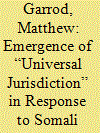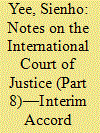|
|
|
Sort Order |
|
|
|
Items / Page
|
|
|
|
|
|
|
| Srl | Item |
| 1 |
ID:
170427


|
|
|
|
|
| Summary/Abstract |
This Article analyzes whether the 1951 San Francisco Peace Treaty, the only multilateral international agreement that draws borders in East Asia, resolves the longstanding dispute over Dokdo between Korea and Japan. It uses the dispute to draw larger lessons about the nature of the treaty that ended World War II in the Pacific and how it structured the peace in Asia differently from that in Europe. It uses U.S. archival material to reconstruct the history of the making of the Treaty, which continues to be the most significant international legal instrument governing post-WWII Asia.
|
|
|
|
|
|
|
|
|
|
|
|
|
|
|
|
| 2 |
ID:
170428


|
|
|
|
|
| Summary/Abstract |
Since the 1980s, the idea that piracy is the “original” and “paradigmatic” universal jurisdiction crime in customary international law has been increasingly supported by weighty scholarship. In the wake of the unprecedented surge in Somali piracy, this view is gaining ground among various powerful actors in international law. Yet, remarkably little empirically grounded scholarship exists in support of universal jurisdiction. This Article provides the first comprehensive empirical analysis of state practice in response to Somali piracy in a ten-year period since 2006. Additionally, the data on Somali piracy are compared with the empirical findings of state practice regarding international crimes, which are more “heinous” than piracy, since the end of World War II to 2016. In so doing, this Article brings new insight and the first thorough critique of what most scholars, governments, the UN and even the International Court of Justice have said on universal jurisdiction, its purpose and the basis for it in international law. In view of inter-state tensions and conflict caused by universal jurisdiction and a move towards law codification, there is now a pressing need for a paradigm shift in the concept of universal jurisdiction for both piracy and international crimes, a step away from conventional scholarly accounts, and the grand narratives from which they proceed, to a position that has a solid basis in the actual practice of states. Empirically and historically informed, it is proposed that “universal jurisdiction” for both categories of crime provides a basis in international law permitting the exercise of national criminal jurisdiction over offences involving foreign nationals abroad that have a close nexus between the case over which jurisdiction is asserted and the state asserting jurisdiction. Common and traditionally held assumptions that universal jurisdiction is based solely on the grave nature of crimes and is applied by states absent any nexus to offences and in the interest of the international community are unfounded.
|
|
|
|
|
|
|
|
|
|
|
|
|
|
|
|
| 3 |
ID:
170431


|
|
|
|
|
| Summary/Abstract |
The invocation of national security exceptions under Article XXI of the General Agreement on Tariffs and Trade (GATT) 1994 has long been viewed as “self-judging”. In the landmark case of Russia—Measures Concerning Traffic in Transit, the panel of the WTO’s dispute settlement body (DSB) addressed two important but previously considered ambiguous issues. First, the Panel confirmed its jurisdiction to review its members’ invocation of Article XXI of GATT 1994. Second, offering a detailed interpretation of Article XXI, especially paragraph (b) and its subparagraph (iii), the panel distinguished the objective requirements from the self-judging features, and held that it has the jurisdiction to determine whether the objective requirements of Article XXI have been satisfied when a member invokes the national security exception, and the member’s discretion is also expected to be limited by its good faith obligation, which, as an established principle of international law, shall apply to both the member’s definition of the essential security interests and its connection to the measures being taken.
|
|
|
|
|
|
|
|
|
|
|
|
|
|
|
|
| 4 |
ID:
170426


|
|
|
|
|
| Summary/Abstract |
During the lead-up to the Final Agreement settling the Macedonian name dispute, apparently no or scant mention was made of the Interim Accord (FYROM v. Greece) case that FYROM brought in 2008 and won overwhelmingly in 2011 against Greece at the International Court of Justice (“ICJ” or the “Court”). This paper highlights the structure and main points of the ICJ judgment in the Interim Accord case and analyzes the part of the judgment on the main substantive issue. The paper argues that, even on its own terms, the Court’s judgment did not conduct the interpretation exercise to the full and further that the experience with the Court’s judgment in this case does flash a warning light to any decision-maker that it must not lose sight of “the one big thing”, which may vary from case to case, in a dispute settlement endeavor if it wants to have its decision implemented. This experience also teaches any State party in a dispute that it may have to know and unyieldingly seize upon the one big thing in the dispute settlement effort in order to achieve its goal.
|
|
|
|
|
|
|
|
|
|
|
|
|
|
|
|
| 5 |
ID:
170430


|
|
|
|
|
| Summary/Abstract |
This article explores the scope of diplomatic immunity ratione materiae under the Vienna Convention on Diplomatic Relations. The difficulty regarding the topic lies in the interpretation of what constitutes an act performed “in the exercise of” diplomatic functions. Based on a critique of differing views, it is argued that diplomatic immunity ratione materiae covers not only official acts stricto sensu, but also certain private acts ancillary or incidental to the performance of diplomatic functions. In practice, the availability of the immunity is heavily dependent on the factual end of a case. Therefore, instead of using general exceptions or standards to denote the scope of the immunity, it is better to determine the immunity on a case-by-case basis in light of the seriousness of an act and the connection between the act and the functions performed.
|
|
|
|
|
|
|
|
|
|
|
|
|
|
|
|
| 6 |
ID:
170429


|
|
|
|
|
| Summary/Abstract |
The United States’ recognition of Israeli sovereignty over the Syrian Golan has been widely considered a flagrant breach of international law. This illegal act gives reason to examine the relationship between the United States under President Trump and international law more generally. Unlike its predecessors, the Trump administration has not just violated international law whenever U.S. economic, political, or strategic interests demanded it to do so, it has rather challenged international law and its institutions as such, and has actively undermined them. The attitude of the Trump administration towards international law and its institutions is marked by an unparalleled contempt or disdain. This article delivers a powerful “J’accuse” against this international law nihilism.
|
|
|
|
|
|
|
|
|
|
|
|
|
|
|
|
|
|
|
|
|